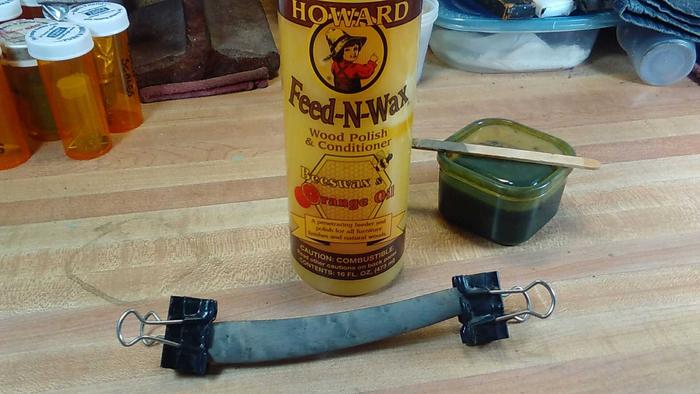Results 11 to 13 of 13
Thread: How to Polish Pinned Scales
-
10-01-2020, 09:14 PM #11I'm a social vegan. I avoid meet.



- Join Date
- Nov 2006
- Location
- Greenacres, FL
- Posts
- 3,226
Thanked: 603 Beeswax
Beeswax
I've read about using beeswax as a polishing agent for scales (horn, and otherwise).
Are there benefits to beeswax, over other waxes/substances? Reasons to not use it? Anything special to know about using it? (amount, application, how to polish it, etc.)
I ask, 'cuz I happen to have a small Dixie-cup of the stuff, and have only used it (in place of Loctite) to prevent threaded fasteners (on bicycles) from loosening.You can have everything, and still not have enough.
I'd give it all up, for just a little more.
-
10-01-2020, 10:36 PM #12

Never used straight Bee's wax, but I've used this before, on wood scales that are oily. ( ebony, African blackwood)

Used as a sealer and conditionerMike
-
10-01-2020, 10:43 PM #13Senior Member



- Join Date
- Apr 2012
- Location
- Diamond Bar, CA
- Posts
- 6,553
Thanked: 3215
Beeswax oil blend, has been used as a furniture “polish”, filler and for light protection, once worked into the pores of the wood or imperfections. Tinted wax was/is melted into imperfections and buffed into the surface to produce a sheen.
I have used Bees Wax on tool handles to provide a low sheen and great grip. The wax I use is Howards Feed &Wax Orange Oil, which is a blend of bee’s wax and oils, the traditional method of application, though there are many recipes and blends.
The best polish on horn is any good abrasive metal polish, provided the scales have been sanded to the appropriate level.
Horn is very forgiving and can easily produce a satin or high gloss finish. It is also very repairable and takes Dyes and Stains very well to match repairs. It also comes in a variety of colors and patterns. Horn is my favorite scale material.
I have never use bees wax on horn scales.


 28Likes
28Likes LinkBack URL
LinkBack URL About LinkBacks
About LinkBacks






 Reply With Quote
Reply With Quote